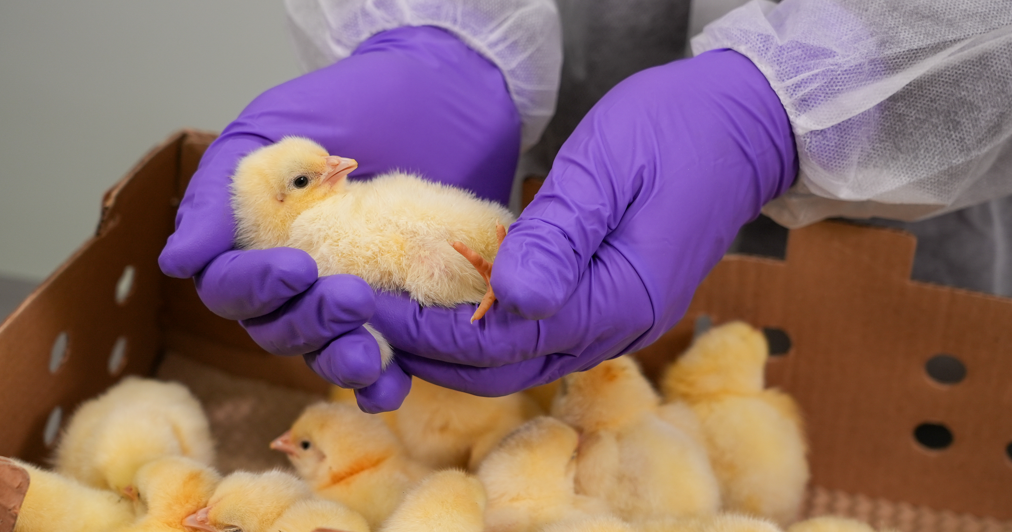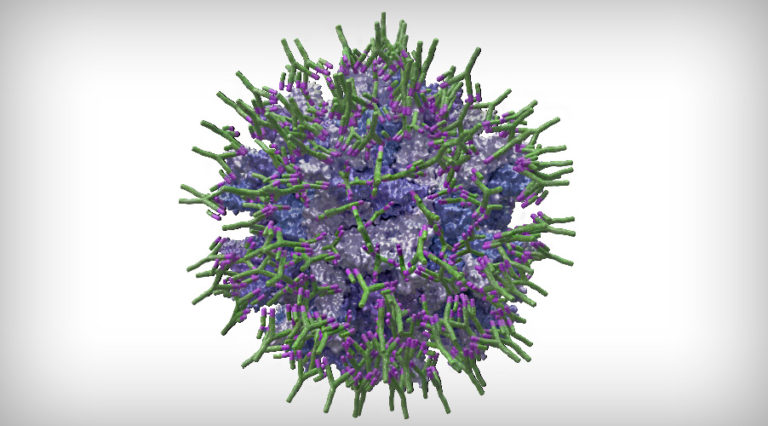Effect of maternally derived antibody levels on hatchery Infectious Bursal disease vaccines
13 March 2023
Live attenuated vaccines against Infectious bursal disease (IBDV) have been the most important and effective tool for preventing the disease since its appearance and are still commonly used worldwide. Nevertheless, the effect of these vaccines can be affected by the presence of maternal antibodies (MDA) in the chick, which will detect the vaccine virus as a threat and will neutralize it, leaving the chick without protection and exposed to an infection once MDAs decline. To avoid this, technological IBDV hatchery vaccines have been developed with the objective of having vaccines that evade the effect of the MDAs.
Maternal antibodies play a very important role in protecting chicks from IBD for the first weeks of life, at a time when the chicks are still not ready to create their own immunity, but the virus may already be present on the farm from the first day. However, these MDAs can have a negative impact on live vaccines if these are applied at the wrong time.
IBDV strains (including field and vaccine strains) can be classified according to their breakthrough titre1. This breakthrough titre determines the ability of the virus to overcome a specific level of maternal antibodies present in the chick and to start replication in the bursa.
This classification is crucial when administering live attenuated vaccines as, if this is not taken into account, vaccination may not be fully efficacious due to vaccine virus neutralization by the MDAs. Thus, when using live attenuated IBD vaccines, it is critical to know which kind of strain is in the vaccine and to calculate the optimal day of vaccination.

In addition to the advantages offered by hatchery vaccination, technological and innovative hatchery Infectious bursal disease vaccines have been developed (recombinant and immune complex vaccines) with the aim of avoiding the effect of maternal antibodies.
The use of immune complex vaccines for the prevention of IBD started in about the 1990’s. These consist of a mixture of a live-attenuated IBD virus with a certain amount of IBDV-specific antibodies (IgY) and are able to induce protection against variable levels of MDAs. It is confirmed that immune complex vaccines are much more efficient compared to the antigens alone in terms of inducing humoral immune response, having a much greater capacity to generate B memory cells2. Moreover, they can prevent premature replication in the bursa and therefore, immunosuppression.

The key point of IBDV immune complex vaccines is to ensure the correct coating of the vaccine virus with the specific IBDV antibodies (IgY), since this correct coating is what will prevent the neutralization of the vaccine virus by maternally derived antibodies (MDAs).
If the correct coating of the vaccine is not guaranteed, the free viruses will compromise the efficacy and safety of the vaccine (reduced potency or safety issues). To avoid the major consequences that this can lead to, new ways of formulating and quality controls have been developed and performed, with next-generation immune complex vaccines now available on the market.
Recombinant vaccines are genetically engineered vaccines in which a gene from one organism (the donor) is inserted into the genome of another organism (the vector) that will express the donor gene when replicating. In the case of IBD recombinant vaccines, the vector is normally an HVT virus that will express the VP2 gene of a specific IBD strain (Faragher strain). The efficacy of HVT-IBD vaccines is then based mainly on humoral protection (no competitive exclusion protection), these vaccines being more suitable for use in low IBDV challenge areas3.
HVT has been used for many years as a vaccine against Marek’s disease due to its poor sensitivity to the interference of maternal antibodies, which is the reason why recombinant vaccines have also been used to evade maternal antibodies4. But there are some studies that suggest that the maternal antibodies could have an effect on the induction of active immunity and that more studies are needed to determine if MDAs are involved5.
These vaccines require time to develop immunity, even more so in the presence of maternal antibodies, thus they are more suitable for long-life birds rather than broilers6 in order to avoid a possible immunity gap.
Despite all the efforts to control IBD with vaccination, interference by maternally derived antibodies is one of the major problems in early vaccination. Thus, it is highly recommended that hatchery vaccines should be used, which can be guaranteed to be effective even in the presence of high levels of maternally derived antibodies.
Next-generation immune complex IBD vaccines that ensure complete IBDV coating at the time of inoculation seem to be the most balanced solution in terms of efficacy and safety.
1. Kumar et al., 2000. Immune responses to intermediate strain IBD vaccine at different levels of maternal antibody in broiler chickens. Tropical Animal Health and Production, 32: 357–360.
2. Klaus, et al., 1978. Generation of B memory cells with preformed antigen-antibody complexes. Immunology 34, 643.
3. Meeusen et al., 2007. Current status of veterinary vaccines. Clin Microbiol Rev 20: 489–510.
4. Tsukamoto et al., 2002. Complete, long-lasting protection against lethal infectious bursal disease virus challenge by a single vaccination with an avian herpesvirus vector expressing VP2 antigens. J. Virol., 76: pp. 5637-5645
5. F. X. Le Gros et al., 2009. Field efficacy trial of a novel HVT-IBD vector vaccine for 1-day-old broilers. Vaccine 27: 592–596.
6. Jack Gelb Jr et al., 2016. Efficacy of Recombinant HVT-IBD Vaccines Administered to Broiler Chicks from a Single Breeder Flock at 30 and 60 Weeks of Age. Avian diseases 60:603–612.
Don't miss any updates
Controller: LABORATORIOS HIPRA, S.A.
Purposes: Managing the contractual and/or business relationship with HIPRA, including sending news, promotions and invitations to events sponsored by HIPRA.
Lawful basis: Performance of the contractual relationship and HIPRA’s legitimate Interest.
Recipients: Third parties to which HIPRA has entrusted cloud computing, security, auditing, mailing, technical and computer support services, as well as companies in its group.
Rights: Request access to and rectification or erasure of personal data and other rights as explained in the additional information. You can seeview the detailed additional information about data protection in our Privacy Policy.
For further information, please check our detailed information on Data Protection.